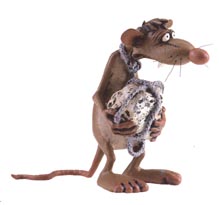Shithouse Rat
Junior Member
  Offline
Offline

The truth hurts...
Posts: 62
|
At this point, freediver, I need to ask - what exactly is this "Theory of Evolution" you are referring to. I began this discussion by making some falsifiably specific assertions about my understanding of your position. You haven’t contested (falsified) them, as yet:-
(i) (Micro) Evolution *is* a valid scientific model.
(ii) Natural Selection *is* a valid scientific model.
(iii) Darwin's explanation of the mechanisms which give rise to species differentiation *is not* a valid scientific model. These mechanisms are (i) and (ii).
(iv) Beneficial Mutation is not scientific. I've not mentioned this one before, but include it here for completeness – I think it’s covered by (i) and (ii).
Are the above correct? If not, I'd appreciate a (falsifiable) statement outlining your conception of a "Theory of Evolution" and what exactly is not falsifiable.
Popper's principle of FALSIFIABILITY was intended to identify pseudo-scientific statements, and yes, ADAPTABILITY is a relevant concept, however the kinds of adaptations he was concerned about were those which were the result of ambiguous terminology or statements which could be endlessly RE-INTERPRETED in response to new information. The key thing to note is that this principle does not refer to the replacement of an old theory with a new one (which is good science, as we have both said), but refers to shifting the goal posts (of definitions and interpretations) in order to keep an old theory intact. The classic examples of pseudo-science are Astrology, where ambiguity and subjectivity allow simple "predictions" to be "validated" at will, and Freudian dream analysis, which produces subjective conclusions which can never be evaluated objectively. Darwin's theory on the origin of species, on the other hand, makes clear objective statements which can in theory be falsified.
If Darwinian theory is generally regarded as scientifically sound (as it is), then ANY speculation about falsification must by definition be hypothetical. Unless you have a REAL alternative hypothesis, you cannot do an experiment to disprove a theory, this is true. This is why I provided examples of REAL alternative hypotheses which you could investigate experimentally, if inclined. Here are some again; expose errors in Darwin's reasoning, demonstrate evidence of spontaneous creation, demonstrate evidence of divine creation, demonstrate evidence of non-genetic evolution, etc. You could do empirical tests to try to reveal any of these phenomena, but my guess is that people have already tried and failed. This is why Darwin's theory remains unfalsified - but still sufficiently specified to enable technically FALSIFYING hypotheses to be formulated. Just invent your own alternative hypothesis and do some experimentation. Simply observing nature is an experiment.
Just to be clear, it is good science to replace an old theory with a new one - the important thing is that a scientific theory must be the one that agrees best with observed nature. If, however, an old theory is sufficiently useful that it can be retained as a subset of a new theory (subject to certain conditions or modifications) then that old theory might retain some value or recognition. Retaining vestiges of the old theory is not scientific, but nostalgic, or practical. If the new theory is sufficiently close to the old theory such that the changes are minimal or evolutionary in nature, then the new theory could (perhaps unscientifically, but very practically) be regarded as an adaptation or revision of the old. This is the form of adaptability I was referring to in my example (as is clear from the carefully worded context). This point is more relevant to Kuhn’s notion of scientific paradigms than Popper’s notion of falsifiability, although it is worth noting that Popper was inspired by Darwinism, and saw the progress of science as an evolutionary process akin to “survival of the fittest”.
(BTW - The gull example relates directly to assertion (iii) above. The gulls are an example of a ring species and not two (or more) distinct species. New species of fruit flies have also been created experimentally by evolutionary processes under laboratory conditions.)
|

 Forum
Forum

 Home
Home 

 Album
Album 

 Help
Help

 Search
Search

 Recent
Recent 

 Rules
Rules 

 Login
Login

 Register
Register





 Pages:
Pages: 

